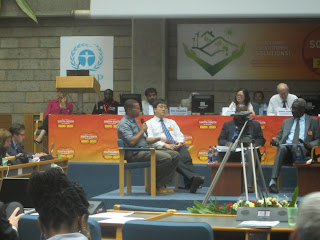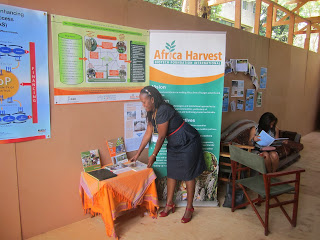By Betty Tole, IFADAfrica
The Global South-South Development (GSSD) Expo 2013 entered its second day yesterday, 29October 2013, featuring Solution Exchange Forums led by various UN agencies and a leadership round table.
Dominic Wanjihia, the CEO of Biogas International Ltd. Kenya, was the first on the floor explaining how the innovative Flexi Biogas Technology that was manufactured in Kenya is expanding renewable energy sources for families in Kenya. The Flexi Biogas System is simpler and less costly to build and operate. So far, over 300 systems have been installed since 2011. IFAD is partnering with Biogas International to install nine systems on dairy farms as part of the IFAD-supported Smallholder Dairy Commercialization Programme in parts of the Rift Valley, in Kenya. In Naivasha, for example, four orphanage schools are using kitchen and human waste to produce electricity for lighting and to provide Internet access. The company is seeking partners to enable scaling-up to other parts of Africa and the rest of the world.
Johannes Linn, Senior Fellow at the Brookings Institution brought in the aspect of focusing on learning from successes and failures in order to achieve south-south cooperation. He said we should put in place a mechanism to drawing on lessons from monitoring and evaluation processes.
The Global South-South Development (GSSD) Expo 2013 entered its second day yesterday, 29October 2013, featuring Solution Exchange Forums led by various UN agencies and a leadership round table.
 |
| IFAD Stand at the GSSD Expo |
The objective of the GSSD Expo Solution Exchange Forums is to provide a platform for interactive discussions and presentation of successful Southern development solutions taking various forms such as southern-grown solutions, south-south partnership solutions, North-South-South triangular partnership solutions, and public-private partnership solutions.
Scheduled at the end of the day was the Solution Exchange Forum 3 on Agriculture and Food Security was led by IFAD and FAO. The solutions presented and discussed in this forum were designed to support families and societies in coping with the effects of climate change and depleting energy sources. The forum was divided into two sessions, starting with FAO and then IFAD.
The Key Note Speaker Dennis Garitty UN Drylands Ambassador and Senior Fellow World Agro-forestry Centre said "even the poorest countries countries can add value". He mentioned south south cooperation among poor countries in west Africa that is yielding results and is being scaled up.
The experience was from agro-forestry work done in Niger, currently at 5 million ha. Through cross country exchange visits and policy support, the technology has spread to Mali 450,000 ha in Seno Plains, Nigeria, Ethiopia Malawi, and currently Zambia are adopting it.
Cheikh Sourang, the IFAD Senior Programme Manager and Focal Point, South-South and Triangular Cooperation, in the Strategy and Knowledge Department, moderated the session, which was later hailed by one of the participants as the most captivating of the day. It was one of the well attended Solution Forum. There was a call to organizers to separate the two sessions for FAO and IFAD next year.
 |
| Cheik Sourang moderates the IFAD Panel Session |
Dominic Wanjihia, the CEO of Biogas International Ltd. Kenya, was the first on the floor explaining how the innovative Flexi Biogas Technology that was manufactured in Kenya is expanding renewable energy sources for families in Kenya. The Flexi Biogas System is simpler and less costly to build and operate. So far, over 300 systems have been installed since 2011. IFAD is partnering with Biogas International to install nine systems on dairy farms as part of the IFAD-supported Smallholder Dairy Commercialization Programme in parts of the Rift Valley, in Kenya. In Naivasha, for example, four orphanage schools are using kitchen and human waste to produce electricity for lighting and to provide Internet access. The company is seeking partners to enable scaling-up to other parts of Africa and the rest of the world.
Abdelkarim Sma, the IFAD Regional Economist for Near East, North Africa and Europe Division, shared on how the shift from conventional to conservation agriculture is happening in the Republic of Moldova. The initiative adopted knowledge management as an instrument to support conservation agriculture. As a result, there has been a significant shift with a third of the 600 trained farmers having adopted conservation farming.
Maija Peltola, Director General of Procasur, a global organization specialized in harvesting and scaling up homegrown innovations. Their models emphasize on supporting rural development using the bottom up approach. The 18 years old organization is facilitating farmer to farmer exchanges both physically and virtually. Since 2006, they have implemented learning routes in more than 30 countries in four continents. She noted that challenges remains top down approach of many institutions.
Liu Ke, the Associate Country Programme Officer of IFAD Asia and the Pacific Division, made a presentation on how China managed to reduce its incidence of poverty between1981 - 2005, using the Household Responsibility System, and other strategies. He shared the lessons they have drawn from the programme key among them – the ownership model – urging countries to “remain at the driving seat” He also called for a culture of learning from mistakes, seeking home driven innovations and also learning from what others have done. Liu’s presentation drew a lot of interest from participants as was evident from their comments during the plenary session.
In his remarks, Steve Thomlow said to achieve south-south cooperation, there is need to create development space by changing the command and control structure. Missing links also need to be addressed. he mentioned that it was interesting that in the whole discussion, the role of the private sector in harnessing inputs, improving access to equipment, access to markets and the issue of access to a financing mechanism.
 |
| Africa harvest Presentation Stand at GSSD |
Johannes Linn, Senior Fellow at the Brookings Institution brought in the aspect of focusing on learning from successes and failures in order to achieve south-south cooperation. He said we should put in place a mechanism to drawing on lessons from monitoring and evaluation processes.
The last speaker, Robson Mutandi, theIFAD Country Director in Ethiopia asked the question ‘why and what are we scaling up?’ He said without credible data and information, and evidence of the models that work, scaling up will not work. He said there is need for an innovation enabled environment, that is, "the system should allow you to experiment on scaling up” said Mutandi. He said to achieve south-south cooperation there is need for partnerships, to address the issue of limited resources.
The session closed with comments and questions from participants. The discussions will be continued during another IFAD Partnership Forum “Scaling up Development Impact through South-South and Triangular Cooperation scheduled on Thursday, 31 October 2013.

















